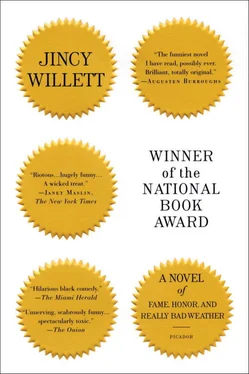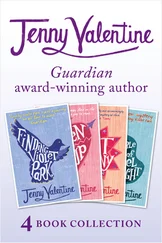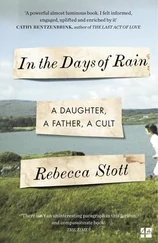Dorcas: “The name of the boat just happened to be the Mayflower .”
Abigail: “They came over in 1620 instead of 1920. Big deal.”
Dorcas: “We are all the children of immigrants.”
Abigail: “Ours just happened to speak English.”
Dorcas: “We’re no better than anyone else.”
Child of recent immigrants: “No shit.”
Mother was always sending us out into the world with instructions on how to win friends, and it didn’t take us long to figure out that she didn’t have a clue. “When the other children call you by… that name,” my mother said to me (after the night Father explained to her about dorks), “you just look right at them and say, ‘Do you know that when you call me… that name… you hurt my feelings very badly?’ Just look right at them and say it straight. You’ll be very surprised at how quickly they change their ways.”
Mike Callahan, my nemesis, couldn’t believe his luck. “Awwwww. I hurt your feelings. You gonna cry? HEY EVERYBODY! THE DORK IS GONNA CRY, BECAUSE HER FEELINGS AREHURT…”
“All right. When they call you… that name… just answer to it, as though it didn’t bother you at all. Don’t give them the satisfaction of reacting to it. You’ll spoil their fun, and in no time they’ll get tired of teasing you and begin calling you by the right name.”
Again I delighted the bullies and their sycophants, who, after two weeks, showed no signs of boredom with their magical ability to make me acknowledge at their every whim that my name was a dirty word. In one way Mother was right: they did tire of using “dork” to get my weird, obliging attention, and soon they began calling me “Ass Hole.”
“When they call you… that word,” advised my dear mother, “you just look right at them and say, in a voice clear as a bell, ‘Sticks and stones may break my bones, but names will hurt me not.’”
The next day Mike Callahan called out to me in the playground during recess. “Ass Hole! Yeah, you! Watcha doin’, Ass Hole?”
I walked over and stood in front of him and his semicircle of snorting admirers, and I said to him in a voice clear as a bell, looking right at him, “You are a stupid, ugly little boy, and an Irish Catholic, and when you grow up you’ll belong to a labor union and live in a tenement and have ten kids and turn into a big stupid drunk.”
Mike Callahan looked as if he had been axed in the center of his forehead. His face turned red and his eyes filled and he was apparently struck dumb. This was one of the happiest moments of my life.
My mother hung up the phone. “Did you call Mike Callahan an Irish Catholic?”
“Yes,” I said.
“Why?”
“I wanted to hurt him,” I said.
When Abigail came up to bed that night she brought me some supper. “Mom’s still mad,” she told me. “She keeps saying to Dad that she can’t understand deliberate cruelty in a child of hers. Dad just laughs.” Abigail watched while I munched cold chicken and carefully wiped my greasy fingers on the napkin she had brought. “Why did you do it?” she asked.
“I already said. To hurt him. He’s been hurting me forever.”
“I know that. I mean, why did you admit it?”
It was my turn to stare at Abigail. It was the first time we ever regarded each other across the Ethical Divide.
“Okay. Pretend you’re Mom. Say, ‘Why did you call Mike Callahan an Irish Catholic?’”
“Why did you call Mike Callahan an Irish Catholic?”
Abigail wiped the conspiratorial expression off her face and assumed the piercing innocence of a child martyr. “Did I do something wrong, Mother? Is it bad to say that someone is an Irish Catholic? Isn’t that what he is? I was just saying what you and Father say all the time.” A plump tear appeared in the inside corner of each eye. “I’m sorry, Mother,” she said, “and I’ll never, ever do it again.”
What strikes me about it still is not how good she was at it, moving me almost to tears of pity in spite of everything, but how strange she was to me at that moment, and from then on, really. I know Abigail better than anyone else in the world, and if I were asked to explain this or that particular thing, I could probably give a fairly accurate account of her motivations. I can report that duty has never played an even minor part in her decisions; that she is moved solely by the desire for pleasure and the avoidance of pain; that she derives pleasure from an astonishing variety of sources, and pain from astonishingly few; and so on. I can even predict her behavior, with a respectable success rate.
But I don’t understand her at all. To understand you have to do more than predict and explain. You must feel some degree of empathy. I have a greater understanding of cats and internal combustion engines and Iranians than I do of my twin sister, Abigail.
Chapter Three
Jungle Drums

Chapter 3
Coming of Age
Adolescence came upon Abigail Mather like a bad dream. She woke up one morning with agonizing, cramping pains, the white sheets of her childbed [!!!] awash in blood. What was happening to her? “I thought I was dying,” she says now. “That I had done something terrible, and that God was punishing me…”
—————
Scotch in coffee really isn’t as awful as it sounds. Abigail really despises Hilda. I always knew she thought Hilda was a fool, we both do, but I never before realized the depth of her contempt. This is really a surprise, and not as unpleasant a surprise as it should be. When I first learned that this book was being written, I knew that Abigail would manipulate the truth, as she always has, but I assumed that her sole purpose was to attract the attention of the world, as if she hadn’t had enough of that already. But really, already this stuff is so ludicrous, so trite, that I can see my sister winking, like the cynical old bawd she is. Who is she winking at? Me?
Abigail’s adolescence came upon the rest of us like a bad dream. We woke up one morning with jalopy tracks across our front lawn, outsized footprints in the flowerbeds, squashed tomatoes from our father’s garden piled in a telltale smelly heap beneath my sister’s tomato-fouled bedroom window, and the air, outside and in, tangy and gross with musk. When I say that from that time on, in the black of night, I sometimes heard outside the house the howling of animals who run in packs, the yowling of animals who hunt alone, I am not, strictly speaking, kidding around. This is actually how I remember things.
When she was out on bail and holed up with me, and the press besieged us night and day and camped out on our porch and we couldn’t use our own telephone, I felt rather as if I had gone back in time, to the familiar nightmare world of Abigail’s adolescence.
The implication that Mother did not prepare her daughters for the fact of menstruation is an actionable lie, or would be if Mother were still alive. But this is how my sister works. She loved our mother as much as I did, but Mother is gone now, and so, in Abigail’s mind, incapable of being wronged.
Mother prepared us by sending us to talk to Father, who prepared us by drawing diagrams on manila paper with a number two pencil. The picture he drew, again and again, was an excellent rendition of that cross-section of the female reproductive system that we see everywhere, in gynecologists’ offices and on tampon boxes, the one as familiar to us as the Bambi face in the “Famous Artists” ad.
I have never had a head for maps. I remember thinking it was interesting, and understanding that it was important, without being able to relate the map to any portion of my body. I still have great difficulty following maps. Spiritually I always face north.
Читать дальше













